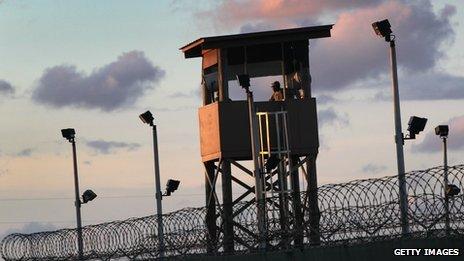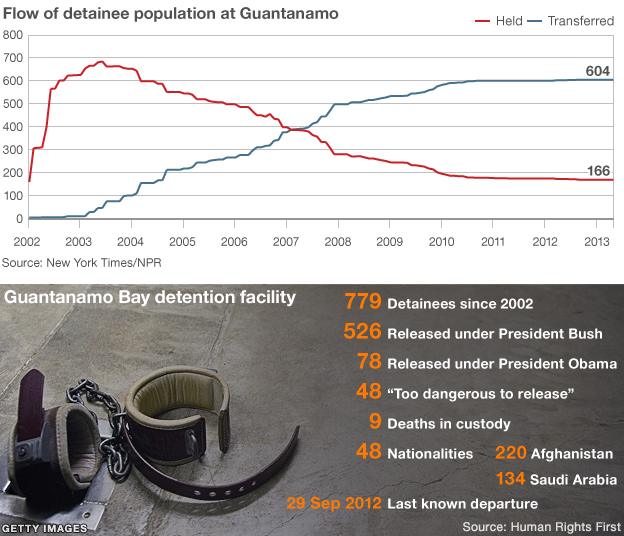Guantanamo detainee describes 'ordeal' of force feeding
- Published

President Obama vowed to close Guantanamo Bay in January 2009
A prisoner currently on hunger strike in Guantanamo Bay has described the pain and discomfort of the force feeding regime at the jail.
Algerian detainee Ahmed Belbacha, in testimony given to the BBC, said the process "hurts a great deal" and many prisoners vomit.
He has been held at the US military prison in Cuba for 11 years, but was cleared for release 6 years ago.
Doctors have called for the detainees to receive independent medical care.
On Wednesday, The Lancet published a letter signed by more than 150 doctors and medical professionals to US President Barack Obama saying the hunger strikers needed doctors they could trust.
Mr Belbacha, 43, told the BBC's Newshour programme through his lawyer: "I tell the doctors that force- feeding me is a violation of their medical ethics, but they say that the order comes from the guards and they have no control."
'Being force fed hurts a great deal'
At least 100 prisoners are protesting against their indefinite detention by refusing food. Mr Obama has said he will make a renewed attempt to close the prison, but he has met with resistance from the US Congress.
Lawyers representing some of those on hunger strike say their clients regularly collapse through weakness as the protest takes its toll.
Lack of trust
Mr Belbacha, who lived in the UK for two years, said every day of the hunger strike was "an ordeal".
Speaking through his lawyer as journalists are not allowed to interview the prisoners, he revealed that he tries to hide it when he vomits because otherwise he would be force-fed again.
He was arrested in Pakistan in December 2001 after the 9/11 attacks and taken to Guantanamo. The US military cleared him for release in 2007, but he says he cannot return to Algeria and no other country has agreed to take him in.
Mr Belbacha said prisoners are shackled as they are force-fed and strapped into a feeding chair with their hands tied to their stomachs. The process is often made worse by the "inexperience or indifference" of medical staff.
"Sometimes they botch putting the tube in and tears stream down my cheek. They used to use my left nostril but it stopped working," the former engineer said.
The letter published in the Lancet medical journal on Wednesday, external said the detainees had "very good reason" not to trust US medical doctors, as they are required to follow orders of military commanders.
"Without trust, safe and acceptable medical care of mentally competent patients is impossible," the letter said.
"Since the detainees do not trust their military doctors, they are unlikely to comply with current medical advice.
"That makes it imperative for them to have access to independent medical examination and advice, as they ask, and as required by the UN and World Medical Association."
Dr Frank Arnold, one of the signatories to the letter, told the BBC: "The UN and numerous other authoritative bodies have quite explicitly stated that the force-feeding that goes on in Guantanamo is torture. Forcing someone to accept treatment which they're competent to refuse is an assault."
The current hunger strike, which began in February, is the longest in the military prison's history. Lawyers representing detainees say it was sparked by tougher prison searches.

The US military, which runs the camp, says those searches uncovered various banned items, including homemade weapons that have been used to attack prison guards.
The detainees' lawyers claim that during those searches the Koran was mishandled - something the US military strongly denies.
The signatories to the Lancet letter add that if detainees are ever to be transferred out of Guantanamo, they must be fit to do so.
They said doctors were "prepared to visit [the detainees] under appropriate conditions, to assist in their recovery and release, and certify when we are confident it is medically safe for them to fly".
- Published6 June 2013
- Published6 June 2013
- Published17 June 2013